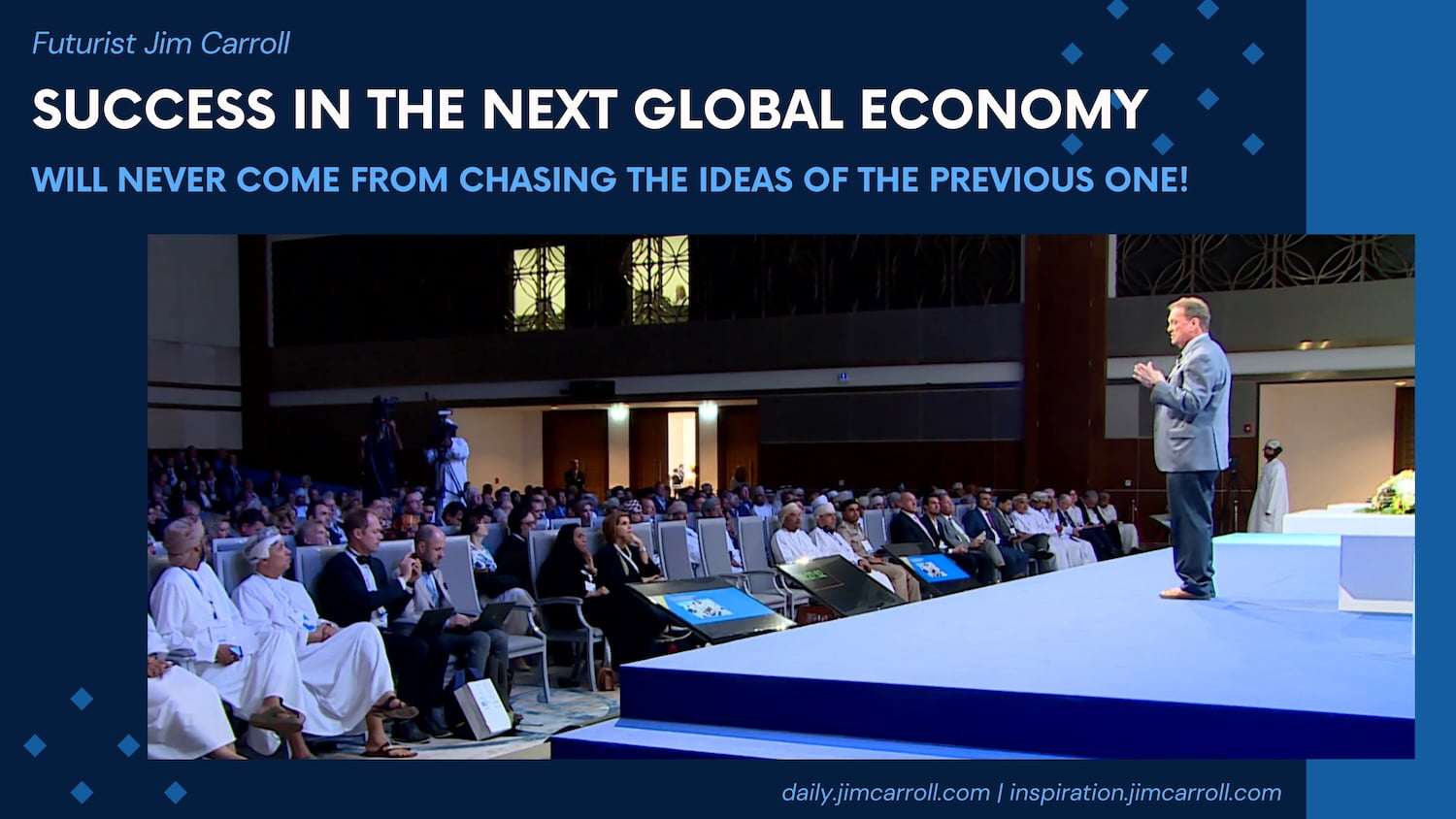“Success in the next global economy will never come from chasing the ideas of the previous one!” – Futurist Jim Carroll

Here we go again!
History regularly has us this in these moments where we are surrounded by those who think progress involves going back to where we were, and those who believe that we should be going to where we will be going. Many aspects of the future are inevitable, and yet vast numbers of people try to avoid the reality of what it represents. The result is that they are left behind, the victim of false promises, while those who align to tomorrow and accept its realities are those who move ahead.
It’s always been this way. You can try to ignore its existence, the future has a funny way of happening anyway!
To me, certain things are certain, inevitability is inevitable, and trends keep trending. The implications are obvious.
Old-style manufacturing is dead. The next era of manufacturing involves a lot of intelligent AI-managed assembly lines, new methodologies such as 3d printing, advanced manufacturing methodologies, new materials, robotics, accelerated R&D and time to market, iterative product reinvention, and advanced skills. The skills of the typical manufacturing worker of tomorrow will bear no resemblance to those of today, and if people aren’t retrained, the jobs move elsewhere.
Next energy healthcare involves such things as pharmacogenetics (DNA-specific pharmaceuticals), the rapid emergence of new forms of treatment and disease diagnosis, lab-grown or 3d printed body parts, the acceleration of medical science, human connectivity, accelerated brain science, and new forms of disease prevention. Some will take advantage of these opportunities and achieve greater longevity; others will cling to outdated mindsets and pseudo-science and will succumb to an earlier departure.
The next-generation energy sector involves a transition from centralized power production based on legacy generation methodologies to one of massively distributed energy generation based on renewables, batteries, hyperconnected living and work facilities, intelligent energy consumption based on connected devices, and more. Next-generation utility companies will have pursued this business model; others will have become the dinosaurs of yesterday, legacy companies that thought they could regulate their way into tomorrow.
The new world of insurance involves underwriting insurance risk based on real-time analysis of massive data sets generated in an instant by highly connected intelligent devices – whether it’s your car or your body – rather than looking back in time. The new world of retail involves one in which we spend a lot of time going to stores to get stuff, in more of that stuff will quickly come to us, often by drone and other sophisticated last-mile delivery technologies. The old world of construction had lots of people going to a site and spending time to assemble every last inch and rivet of a building on site. The new world of construction sees more of that assembly happening in a modular fashion, in a factory, with rapid assembly on site.
The old world of education had young people going to colleges and universities to get a foundational education that would lead them to a job for life. The new world has them continuously generating just-in-time knowledge via YouTube and other educational technologies and methodologies – and increasingly, by AI avatar assistants – and pursuing dozens if not hundreds of micro-careers in a continual side hustle.
Every single industry will see massive challenges and change with necessary skill sets – a lot of new jobs will have emerged while existing ones will have disappeared.
Which world are you in? The old one, or the new one
These things are wishful thinking; they aren’t the ravings of a futuristic mind. They are the facts of the future. Like it or not, some countries are busily aligning themselves to the reality of these trends. Others like to pretend that they can go back to the 50s or 70’s or 90s. It doesn’t work that way.




GET IN TOUCH
Jim's Facebook page
You'll find Jim's latest videos on Youtube
Mastodon. What's on Jim's mind? Check his feed!
LinkedIn - reach out to Jim for a professional connection!
Flickr! Get inspired! A massive archive of all of Jim's daily inspirational quotes!
Instagram - the home for Jim's motivational mind!